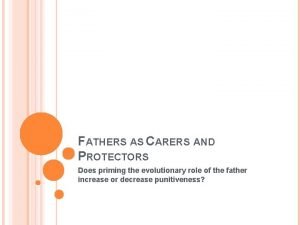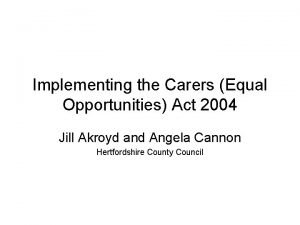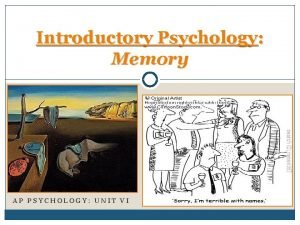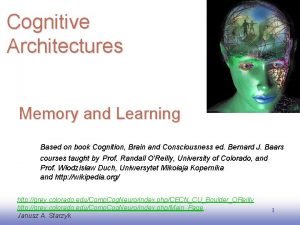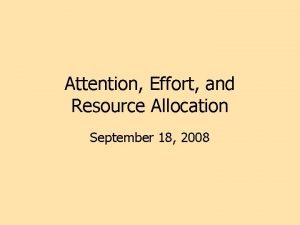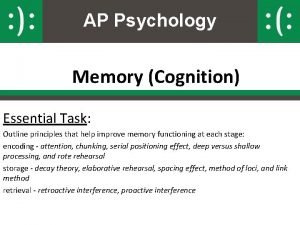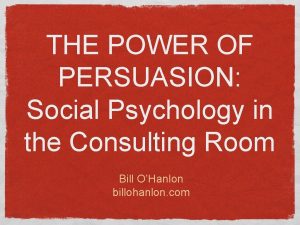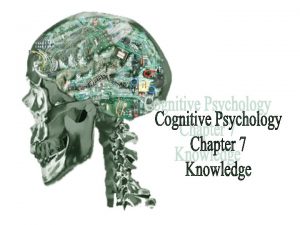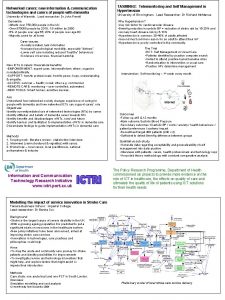FATHERS AS CARERS AND PROTECTORS Does priming the




















- Slides: 20

FATHERS AS CARERS AND PROTECTORS Does priming the evolutionary role of the father increase or decrease punitiveness?

PARENTING IN NEW ZEALAND An increasing number of parents are choosing not to use smacking as a method of discipline (44%, April 2012) Only 1% of parents report regularly smacking their children (April 2012, Family First) Since 2007, there has been a sharp increase in parents choosing to ask social services for help and attend parenting classes AND YET. . . New Zealand has the fifth highest rate of child maltreatment-related death in the OECD

THE ‘ANTI-SMACKING LAW’ In 2007 an amendment to Section 59 of the Crimes Act removed the defence of reasonable force that adults could use to justify the use of physical discipline against children This law is, in part, a response to the child abuse and maltreatment rates in New Zealand While it may be justified, the ‘anti-smacking law’ is not addressing abuse before it happens

THE FACTS. . . Men are more commonly the major aggressors in a family Fathers are more likely to be physically abusive towards children than mothers Fathers are more likely to use physical disciplinary methods, such as smacking, than mothers

THE PROBLEM. . . As social and gender roles change, fathers are becoming more involved in their children’s lives than ever before New Zealand legislation focuses on educating, protecting, and supporting mothers General parenting programs and resources (SKIP, Families First, The Incredible Years) are reasonably widespread and accessible Specific fathering programs are restricted and difficult to access (Dads 4 Dads; Wellington and Waikato only)

WHAT NEEDS TO BE DONE? Research and implement strategies that are specifically relevant to fathers Make parenting classes useful to Dads Incorporate change techniques for fathers that are brief, inexpensive and efficient

POSITIVE AFFECTIVE PRIMING A brief but powerful technique for changing people’s cognitions Has a short term but significant effect on specific emotions without the person’s conscious awareness Parenting is a highly emotive experience and therefore an underlying parenting schema may respond to priming, changing the way parents think about and respond to child misbehaviour

POSITIVE AFFECTIVE PRIMING WITH FATHERS Priming with fathers was undertaken by showing participants emotive images of Dads interacting with their children The content of the priming images was considered important Fathers have distinct roles from mothers in childrearing, so some of the fathers were exposed to images reflective of those roles as outlined in evolutionary literature

THE EVOLVED ROLES OF FATHERS Due to differing evolutionary pressures and advantages, males and females traditionally play different roles in child-rearing Typically mothers invest more time and energy in child-rearing than fathers, and are responsible for providing love, nurturance and discipline Fathers are protectors, providers of required resources, and teachers of physical skills

THE RESEARCH Two groups of fathers of young children were exposed to emotive priming images One group was exposed to general images, while the other group was exposed to images relevant to the evolved roles of fathers Both groups completed surveys regarding their opinions about child misbehaviour and their likely disciplinary responses, before and after exposure to the primes

GENERAL POSITIVE PRIMES

EVOLUTIONARY-BASED PRIMES

THE RESULTS The group of fathers exposed to the general priming images became slightly less punitive and less blaming for child misbehaviour The group of fathers exposed the evolutionary images became slightly more punitive and more blaming for child misbehaviour The result with the evolutionary group was the opposite effect to what we hypothesised

WHAT CAUSED THIS RESULT? Evolutionary images centred around fathers protecting children from danger made fathers anxious and therefore more punitive? The images were representative of more traditional fathering roles and fathers became more punitive as they thought this was expected of them? General negative reaction to the images, which the fathers may not have felt represented the modern father’s roles

THE ROLE OF MODERN FATHERS Fathers are no longer confined to traditional fathering roles – protector, provider, teacher On top of these roles fathers now also consider providing love, nurturance and discipline their domain too, rather than belonging exclusively to mothers Today’s fathers are much more involved in their children’s lives than their Dads were with them

CHANGING ROLES The demands of modern society may be responsible for the changing roles fathers see themselves as needing to meet While men were traditionally the ‘bread-winner’ of the family in the past, it is becoming increasingly acceptable for fathers to be stay-at-home Dads while their partner returns to work While evolved roles are still important for fathers, and distinct roles for each parent still exist, these seem to be less fixed

WHAT FATHERS THINK. . . Fathers no longer have clear, defined roles separate from mothers; they are becoming more involved with their kids Parenting is challenging and demanding Fathers are willing to get help when they need it and are interested in utilising resources and support if it is available

FUTURE RESEARCH Expand the experiment to determine whether priming is a useful intervention with fathers Use a larger sample and a control group, and see whether the unexpected result with exposure to evolutionary-based primes is repeated Talk to Dads in New Zealand more, to establish in greater depth exactly what it means to be a modern father

WHAT WE NEED TO DO Research the role of the modern father in greater depth Learn what the modern father in New Zealand is struggling with, and what part he plays in his children’s lives Provide easy-to-access, cheap and user-friendly resources, support and teaching specifically aimed at fathers and their unique needs

THANKS FOR LISTENING! Questions and comments?
 Fathers are protectors
Fathers are protectors Department of work and pensions
Department of work and pensions Suction training for carers
Suction training for carers York young carers
York young carers Barnet carers
Barnet carers Manchester carers forum
Manchester carers forum Equal opportunities act 2004
Equal opportunities act 2004 Priming memory examples
Priming memory examples Priming memory
Priming memory Priming hplc
Priming hplc Priming memory
Priming memory Deep processing ap psychology definition
Deep processing ap psychology definition Rpg test
Rpg test Conceptual priming
Conceptual priming Cherry 1953 dichotic listening
Cherry 1953 dichotic listening Chunking ap psychology examples
Chunking ap psychology examples Conceptual priming
Conceptual priming Konzeptuelles priming beispiel
Konzeptuelles priming beispiel Contoh skema dalam kognisi sosial
Contoh skema dalam kognisi sosial Va ecmo indications
Va ecmo indications Priming
Priming
